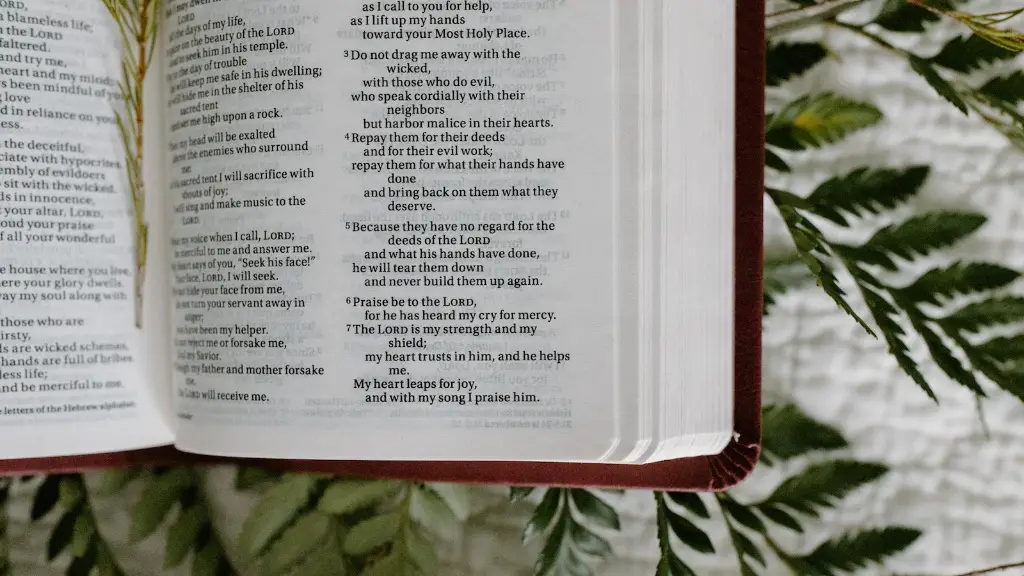Molek’s Role In Ancient Israel
Molek, also known as Molech, was a deity worshiped by the ancient Israelites. He was associated with the Phoenician god Baal and the Canaanite god El. The worship of Molek was practiced in several parts of the region around Jerusalem and involves a pagan ritual in which children would be sacrificed to the deity. Molek is mentioned several times in the Old Testament and is referred to as an “abomination” to the Lord. According to the Bible, Molek was associated with idol-worship, divination, and the offering of sacrifices, including human sacrifice. In the Book of Deuteronomy, the Lord condemns Molek worship and calls it an “abomination.”
Molek was believed to be a penal deity who demanded the sacrifice of infants and children as a form of punishment for sins committed by their parents. Historians believe that this practice began sometime around the 7th or 8th century BC and was part of a belief system whereby the gods demanded blood for sin. This meant that the Israelites would sacrifice their own children as a way of appeasing Molek.
Molek worship was eventually outlawed in the ancient Israelite kingdom, although it continued to be practiced in some Jewish communities until the 6th century BC. Molek is also mentioned in the New Testament, where the apostle Paul speaks out against idol-worship and condemns those who practice it.
His Character
Molek is often portrayed as an evil and cruel deity who demands human sacrifice from the Israelites. He is referred to as the god of the Ammonites and is associated with death, destruction, and calamity. In the Bible, Molek is described as a “fierce and cruel god” who “eats the flesh of his victims.” He was seen as a powerful deity who could inflict destruction and death on those who displeased him. Molek’s cult was one of fear and terror and was believed to bring destruction and suffering upon those who did not offer sacrifices to him.
His Significance
Despite the fact that Molek worship was outlawed in ancient Israel, it continued to be practiced by the Israelites in some form or another. According to some scholars, the practice of child sacrifice was rooted in the misguided belief that offering children to Molek would bring favor and blessings upon the family or community. This misguided belief was likely fostered by powerful and influential figures in Israelite society who believed that sacrificing children to Molek would protect them from destruction and calamity.
The worship of Molek was a major issue in ancient Israel, and it is believed to be one of the reasons why the Israelites began to look for ways to redirect their spiritual and religious life away from paganism and towards a more monotheistic system of beliefs. Molek’s demise marked the beginning of the shift towards a more unified religious system in the ancient world and eventually resulted in the codification of Jewish law.
Molek’s Effect On The Israelites
The worship of Molek had a detrimental effect on the lives of the Israelites. It was associated with human sacrifice and other rituals that are highly frowned upon by most modern religions. The practice of child sacrifice also had a major psychological impact on the Israelites, who would have found it deeply traumatic to have to sacrifice their own children to Molek. Furthermore, child sacrifice was incompatible with monotheism and the faith of the Israelites in the one God.
The Bible also suggests that Molek’s influence in ancient Israel had a negative effect on morality. The prophets condemn the worship of Molek and state that it is a sign of apostasy from the Lord. They warn the people against sacrificing their children to Molek, and suggest that engaging in such practices put Israelites at risk of becoming corrupt. The worship of Molek also had a major effect on economics in the ancient world as it involved the offering of wealth and resources as a form of payment to the deity.
Molek In Comparisons To Baal
Molek was often compared with Baal, the Phoenician storm god. Although there is some debate as to whether or not they are the same deity, there are a few similarities between Molek and Baal. Both are associated with punishment and violence, and both demand human sacrifice in exchange for their blessings. Both deities were also believed to be powerful forces who could bring destruction and death upon those who displeased them.
The differences between Molek and Baal are more interesting, however. While Baal was often seen as a violent and immoral god, Molek was associated with gentleness and love. Molek was also seen as a just god who only demanded human sacrifice from those who had committed some sort of sin. While Molek worship was ultimately outlawed in ancient Israel, some scholars suggest that the worship of Baal was allowed to continue in some form or another.
Molek’s Legacy Today
Today, the worship of Molek is no longer practiced by the Israelites and the legacy of Molek has been lost to the dust of time. However, some scholars have argued that Molek still lives on in the modern world, albeit in different guises. Many have argued that the idea of sacrificing children to appease some supernatural force or deity is still embedded in our collective consciousness and can be seen in certain aspects of modern culture.
Molek’s legacy may also be seen in the way that many people strive for perfection, which some say is a throwback to the belief that sacrificing children would somehow bring divine favor. Additionally, the taboo surrounding child sacrifice and the associated guilt, shame, and horror of engaging in such a practice still lingers in our subconscious and can be seen in various aspects of modern life.
Molek’s Impact On Religion And Theology
Molek’s demise marked the beginning of the shift away from paganism and towards a more unified religious system in the ancient world. Molek’s ritual of child sacrifice represented a major challenge to the worship of the one true God and his cult was seen as a direct affront to the teachings of the prophets. As such, the faith of the Israelites was greatly strengthened by their rejection of Molek and their subsequent commitment to monotheism.
Molek’s influence can also be seen in the ways that modern day theologians and religious scholars have studied and analyzed the implications of child sacrifice in world religions. Many have argued that Molek’s ritual sheds light on complex ethical questions, such as the morality of sacrificing children in exchange for power or favors, and its implications for human moral development. Scholars have argued that the understanding of the issues raised by Molek’s cult informs modern day debate on ethical issues in different religions.
Molek’s Influence On Psychology
The worship of Molek has affected psychological thought and has been a source of inspiration for many psychologists who have studied the implications of child sacrifice. Psychologists have used it as a starting point to study the psychology of religion, cults, and the role of violence in religious practices. Molek’s cult of child sacrifice has also been studied in terms of its psychological effects on individuals, communities, and societies.
The psychological effects of child sacrifice are complex, and the trauma and fear associated with it can last for generations. Some have argued that the psychological effects of Moloch’s cult may have helped to shape the modern day understanding of childhood trauma and its long-term implications. As such, Molek’s legacy has contributed to deepening the understanding of the implications of child sacrifice and its psychological consequences.
Molek’s Influence On Art And Literature
Molek’s cult has also had a profound influence on art and literature. Throughout the ages, artists and writers have used Molek’s cult as a source of inspiration for their works. The story of Molek’s cult has been used in novels, films, and video games as a way to explore themes of violence, power, and control. Additionally, Molek has been depicted in various works of art, such as sculptures and paintings, as a representation of evil and cruelty.
Molek’s cult has also been used as a form of political commentary in some works of literature. Some authors, such as William Golding in his novel Lord of the Flies, have used Molek’s cult as a way to explore themes of power dynamics and the dangers of unchecked power. Molek’s influence on art and literature serves as a reminder of the dangers of unchecked power and its consequences.


